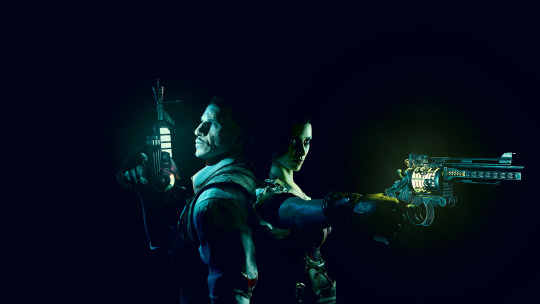#edward rhodes
Text

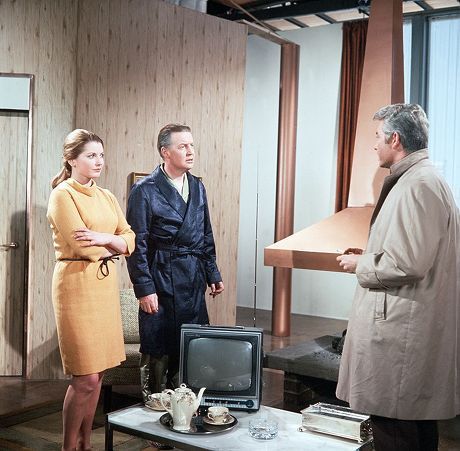
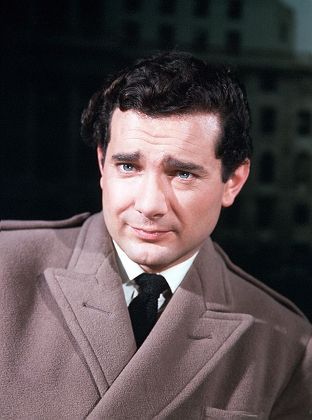

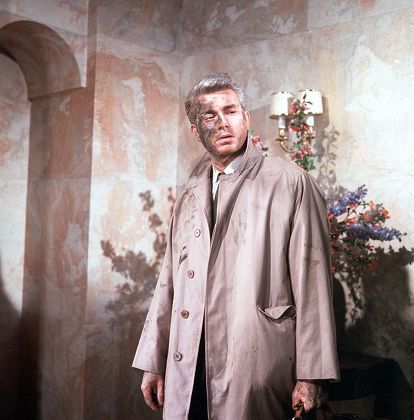
Man in a Suitcase: Web with Four Spiders (1.23, ITC, 1968)
"Why me? With your name all you have to do is pick up your telephone, you'd be up to your neck in nice, keen, young Harvard-trained security boys. Probably drum and bugle corps to boot."
"Yes, and those photographs would be in the FBI dossier."
"Or a private one. I could make copies. See what they'd buy me."
"Oh no, you've already answered that. My name is Norbert; you are a discredited American agent. No one will accept your word against mine."
"Good. But I'm expensive. I call it my self-respect bonus."
#man in a suitcase#web with four spiders#classic tv#edmund ward#robert tronson#richard bradford#ray mcanally#jacqueline ellis#ralph michael#simon oates#warren stanhope#john savident#lawrence james#edward evans#philip bond#edward rhodes#robert macleod#frank forsyth#david cargill#geoffrey reed#katie fitzroy#tony doonan#douglas jones#perhaps the episode I've remembered least so far‚ the whole thing felt almost new to me. probably i didn't really understand it as a kid;#Ward's plot is unashamedly dense‚ with multiple parties vying for for intelligence and shifting allegiances throughout. watching it now#this is actually a brilliant‚ mature bit of tv: the script is blisteringly sharp‚ with Ward content not to spoofeed the answers and allow#the viewer to connect the dots. dialogue is excellent throughout‚ from a particularly flippant and darkly sarcastic McGill in act 1 through#to a bleakly downbeat wrapup. notably this is perhaps the only episode in which McGill fails his case; he failed to prevent bloodshed in#both 1.15 and 1.21‚ but at least exposed the villains. here his failure is absolute (though not really his own fault) and it's writ large#across Bradford's performance in those final scenes‚ as he quietly fumes and skulks and snarls his few lines. an excellent episode.
2 notes
·
View notes
Text
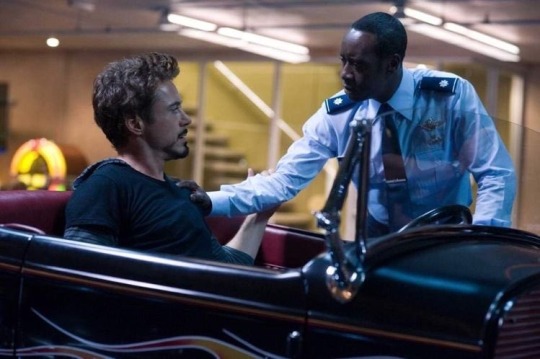
#marvel#nerd#ucm#mcu#pop#iron man#homem de ferro#tony stark#stark#robert downey jr#anthony edward stark#james rhodes#don cheadle
100 notes
·
View notes
Text
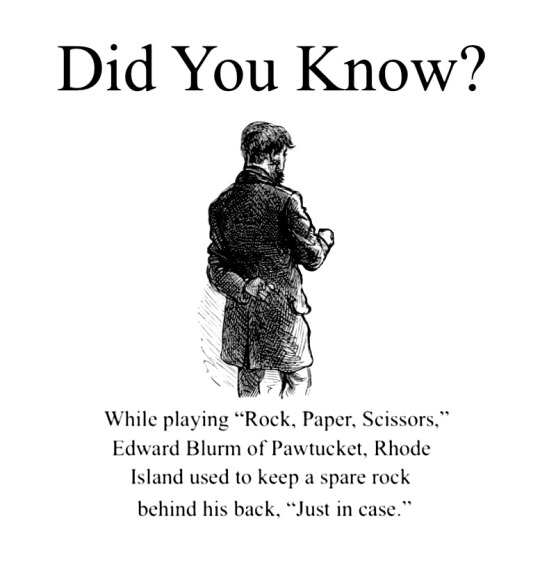
132 notes
·
View notes
Text
Incorrect quotes#114
Y/n: You know my motto: carpe diem, carpe noctem, carpe coles.
Tony: Seize the day, seize the night, what’s the last one?
Y/n: Seize the dick.
#anthony edward stark#tony stark#incorrect marvel quotes#incorrect avengers#incorrect quotes#iron man#tony stark x oc#tony stark incorrect quotes#incorrect tony stark#avenger!reader#incorrect quote generator#avengers x y/n#avengers#marvel#tony stark x reader#tony stark fluff#the avengers#james rhodes#tony stank#Tony Stark#tony stark x y/n#avengers x reader#tony stark imagine#marvel au#marvel x reader#Tony stark x reader#tony stark x femlreader#tony stark fic#Tony x y/n#tony x reader
250 notes
·
View notes
Text
How Rhodey Got His Nicknames- Platypus Edition
I personally like to think that Tony had never gone to the zoo. When Rhodey finds this out, he calls up Mama Rhodes and she makes a date to take Tony to the Zoo. Now, Tony being Tony, he shows up high off his ass and this is how that would go:
It's penguin holding day so Tony gets to hold Penny the Penguin and starts crying because of a cuteness overload and Rhodey buys him a penguin plush because Tony was heartbroken over having to leave Penny
Tony sees flamingos and loves them but says "why are their necks so long" and Rhodey's like "wait 'til you see giraffes"
Case in point, Tony screams when he sees a giraffe and nearly has a panic attack when it licks him
Then they go to see platypods (plural for platypus) and Tony loves them. He just stares at them and Rhodey gets kinda worried like is he okay, does he not like them, is he gonna freak out
And then Tony goes "You're a platypus, Rhodey" and Rhodey turns into the definition of ??? Because what? He asks as much and Tony makes him stand in front of the glass but next to the platypus that swam up so they were side by side and says
"It's brown, just like you."
Rhodey literally almost dies laughing because he knows Tony is high as shit and is so glad Mama Rhodes was recording Tony's reaction to all the animals because he is so going to make fun of Tony after this
When anyone asks why Tony calls Rhodey that, they both just crack up and can't look at each other for thirty minutes without at least smiling
#crack#marvel#mcu#iron man#the avengers#tony stark#anthony edward stark#james rhodes#rhodey#war machine#mama rhodes#platypus#iron husbands#possibly ironhusbands#platonic or romantic#you decide#colonel rhodes
38 notes
·
View notes
Text
Why Robert Oppenheimer's Atomic Bomb Still Haunts Us
— By Richard Rhodes | Published May 15, 2013
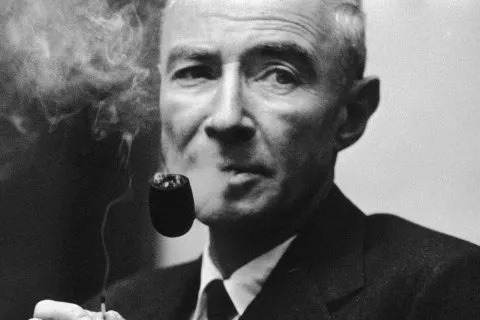
Oppenheimer spearheaded the creation of the atom bomb. René Burri/Magnum
Robert Oppenheimer oversaw the design and construction of the first atomic bombs. The American theoretical physicist wasn't the only one involved—more than 130,000 people contributed their skills to the World War II Manhattan Project, from construction workers to explosives experts to Soviet spies—but his name survives uniquely in popular memory as the names of the other participants fade. British philosopher Ray Monk's lengthy new biography of the man is only the most recent of several to appear, and Oppenheimer wins significant assessment in every history of the Manhattan Project, including my own. Why this one man should have come to stand for the whole huge business, then, is the essential question any biographer must answer.
It's not as if the bomb program were bereft of men of distinction. Gen. Leslie Groves built the Pentagon and thousands of other U.S. military installations before leading the entire Manhattan Project to success in record time. Hans Bethe discovered the sequence of thermonuclear reactions that fire the stars. Leo Szilard and Enrico Fermi invented the nuclear reactor. John von Neumann conceived the stored-program digital computer. Edward Teller and Stanislaw Ulam co-invented the hydrogen bomb. Luis Alvarez devised a whole new technology for detonating explosives to make the Fat Man bomb work, and later, with his son, Walter, proved that an Earth-impacting asteroid killed off the dinosaurs. The list goes on. What was so special about Oppenheimer?
He was brilliant, rich, handsome, charismatic. Women adored him. As a young professor at Berkeley and Caltech in the 1930s, he broke the European monopoly on theoretical physics, contributing significantly to making America a physics powerhouse that continues to win a freight of Nobel Prizes. Despite never having directed any organization before, he led the Los Alamos bomb laboratory with such skill that even his worst enemy, Edward Teller, told me once that Oppenheimer was the best lab director he'd ever known. After the war he led the group of scientists who guided American nuclear policy, the General Advisory Committee to the U.S. Atomic Energy Commission (AEC). He finished out his life as director of the prestigious Institute for Advanced Study in Princeton, New Jersey, where he welcomed young scientists and scholars into that traditionally aloof club.
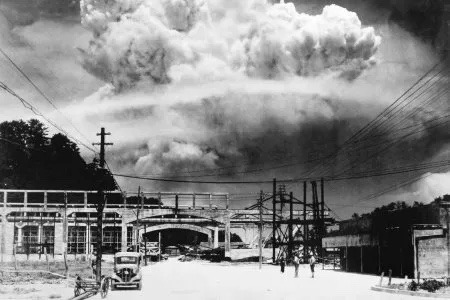
August 9, 1945: Nagasaki is hit by an atom bomb. Nagasaki Atomic Bomb Museum/EPA
Those were exceptional achievements, but they don't by themselves explain his unique place in nuclear history. For that, add in the dark side. His brilliance came with a casual cruelty, born certainly of insecurity, which lashed out with invective against anyone who said anything he considered stupid; even the brilliant Bethe wasn't exempt. His relationships with the significant women in his life were destructive: his first deep love, Jean Tatlock, the daughter of a Berkeley professor, was a suicide; his wife, Kitty, a lifelong alcoholic. His daughter committed suicide; his son continues to live an isolated life.
His Choices or Mistakes, Combined with his Penchant for Humiliating Lesser Men, Eventually Destroyed Him.
Oppenheimer's achievements as a theoretical physicist never reached the level his brilliance seemed to promise; the reason, his student and later Nobel laureate Julian Schwinger judged, was that he "very much insisted on displaying that he was on top of everything"—a polite way of saying Oppenheimer was glib. The physicist Isidor Rabi, a Nobel laureate colleague whom Oppenheimer deeply respected, thought he attributed too much mystery to the workings of nature. Monk notes his curiously uncritical respect for the received wisdom of his field.
Monk's discussion of Oppenheimer's work in physics is one of his book's great contributions to the saga, an area of the man's life that previous biographies have neglected. In the late 1920s Oppenheimer first worked out the physics of what came to be called black holes, those collapsing giant stars that pull even light in behind them as they shrink to solar-system or even planetary size. Some have speculated Oppenheimer might have won a Nobel for that work had he lived to see the first black hole identified in 1971.
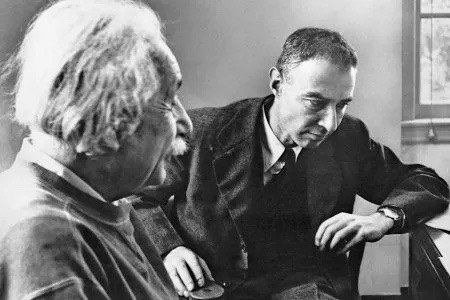
Oppenheimer with Albert Einstein, circa the 1940s. Corbis
Oppenheimer's patriotism should have been evident to even the most obtuse government critic. He gave up his beloved physics, after all, not to mention any vestige of personal privacy, to help make his country invulnerable with atomic bombs. Yet he risked his work and reputation by dabbling in left-wing and communist politics before the war and lying to security officers during the war about a solicitation to espionage he received. His choices or mistakes, combined with his penchant for humiliating lesser men, eventually destroyed him.
One of those lesser men, a vicious piece of work named Lewis Strauss, a former shoe salesman turned Wall Street financier and physicist manqué, was the vehicle of Oppenheimer's destruction. When President Eisenhower appointed Strauss to the chairmanship of the AEC in the summer of 1953, Strauss pieced together a case against Oppenheimer. He was still splenetic from an extended Oppenheimer drubbing delivered during a congressional hearing all the way back in 1948, and he believed the physicist was a Soviet spy.
Strauss proceeded to revoke Oppenheimer's security clearance, effectively shutting him out of government. Oppenheimer could have accepted his fate and returned to an academic life filled with honors; he was due to be dropped as an AEC consultant anyway. He chose instead to fight the charges. Strauss found a brutal prosecuting attorney to question the scientist, bugged his communications with his attorney, and stalled giving the attorney the clearances he needed to vet the charges. The transcript of the hearing In the Matter of J. Robert Oppenheimer is one of the great, dark documents of the early atomic age, almost Shakespearean in its craven parade of hostile witnesses through the government star chamber, with the victim himself, catatonic with shame, sunken on a couch incessantly smoking the cigarettes that would kill him with throat cancer at 63 in 1967.
Rabi was one of the few witnesses who stood up for his friend, finally challenging the hearing board in exasperation, "We have an A-bomb and a whole series of it [because of Oppenheimer's work], and what more do you want, mermaids?" What Strauss and others, particularly Edward Teller, wanted was Oppenheimer's head on a platter, and they got it. The public humiliation, which he called "my train wreck," destroyed him. Those who knew him best have told me sadly that he was never the same again.
For Monk as for Rabi, Oppenheimer's central problem was his hollow core, his false sense of self, which Rabi with characteristic wit framed as an inability to decide whether he wanted to be president of the Knights of Columbus or B'nai B'rith. The German Jews who were Oppenheimer's 19th-century forebears had worked hard at assimilation—that is, at denying their religious heritage. Oppenheimer's parents submerged that heritage further in New York's ethical-culture movement that salvaged the humanism of Judaism while scrapping the supernatural overburden. Oppenheimer, actor that he was, could fit himself to almost any role, but turned either abject or imperious when threatened. He was a great lab director at Los Alamos because of his intelligence—"He was much smarter than the rest of us," Bethe told me—because of his broad knowledge and culture; because of his psychological insight into the complicated personalities of the gifted men assembled there to work on the bomb; most of all because he decided to play that role, as a patriotic citizen, and played it superbly.
Monk is a levelheaded and congenial guide to Oppenheimer's life, his biography certainly the best that has yet come along. But he devotes far too many pages to Oppenheimer's Depression-era flirtation with communism, a dead letter long ago and one that speaks more of a rich esthete's awakening to the suffering in the world than to Oppenheimer's political convictions. He doesn't always get the science right. Most of the errors are trivial, but a few are important to the story.
Their Fundamental Objection Was to Giving up Production of Real Weapons so That Teller Could Pursue His Pipe Dream, a Dead-end Hydrogen Bomb Design.
A fundamental reason Oppenheimer opposed a crash program to develop the hydrogen bomb in response to the first Soviet atomic-bomb test in 1949 was the requirement of Edward Teller's "Super" design for large amounts of a rare isotope of hydrogen, tritium. Tritium is bred by irradiating lithium in a nuclear reactor, but the slugs of lithium take up space that would otherwise be devoted to breeding plutonium. To make tritium for a hydrogen bomb that the U.S. did not know how to build would have required sacrificing most of the U.S. production of plutonium for devastating atomic bombs the U.S. did know how to build. To Oppenheimer and the other scientists on the GAC, such an irresponsible substitution as an answer to the Soviet bomb made no strategic sense. It's true that the hydrogen bomb with its potentially unlimited scale of destruction made no military sense to them either—and was morally repugnant to some of them as well. But their fundamental objection, which Monk overlooks, was to giving up production of real weapons so that Teller could pursue his pipe dream, a dead-end hydrogen bomb design that never worked.
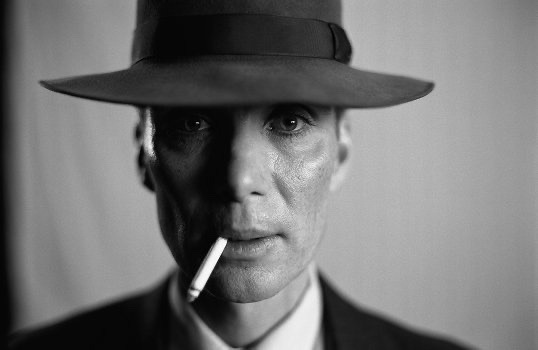
Julius Robert Oppenheimer (April 22, 1904 – February 18, 1967)
More egregious is Monk's notion that the Danish physicist Niels Bohr, Oppenheimer's mentor during the war on the international implications of the new technology, pushed for the bomb's use on Japan to make its terror manifest. He did not. He pushed, to the contrary, for the Allies, the Soviet Union included, to discuss the implications of the bomb prior to its use and to devise a framework for controlling it. Bohr foresaw that the bomb would stalemate major war, as it has, but correctly feared that U.S. secrecy about its development would lead to a U.S.-Soviet arms race. He conferred with both Roosevelt and Churchill about presenting the fact of the bomb to the Russians as a common danger to the world, like a new epidemic disease, that needed to be quarantined by common agreement. Churchill vehemently disagreed, and Roosevelt was old and ill. The moment passed. The arms race followed, as Bohr foresaw, and with diminished force, among pariah states like Iran and North Korea, continues to this day.
Monk's Oppenheimer is a less appealing figure than the Oppenheimer of previous biographies, perhaps because, as an Englishman, Monk is less susceptible to Oppenheimer's rhetorical gifts and more candid about calling out his evasions. He pulls together most of what several generations of Oppenheimer scholars have found and offers new revelations as well. Yet there's a faint whiff of condescension in his portrait, and the real Oppenheimer, the man whom so many loved and admired, still somehow escapes him. He misses the deep alignment of Robert Oppenheimer's life with Greek tragedy, the charismatic hubris that was his glory but also the flaw that brought him low. But maybe I'm expecting too much: maybe only a large work of fiction could assemble that critical mass.
#Robert Oppenheimer#Atomic Bomb#Richard Rhodes#World War II#Manhattan Project#Ray Monk#Gen. Leslie Groves#Pentagon#Hydrogen Bomb#Edward Teller | Stanislaw Ulam#Nobel Prize#Princeton University#Albert Einstein#President Eisenhower#Lewis Strauss#Hydrogen | Tritium | Plutonium#Roosevelt | Churchill#US — Soviet Union
15 notes
·
View notes
Text

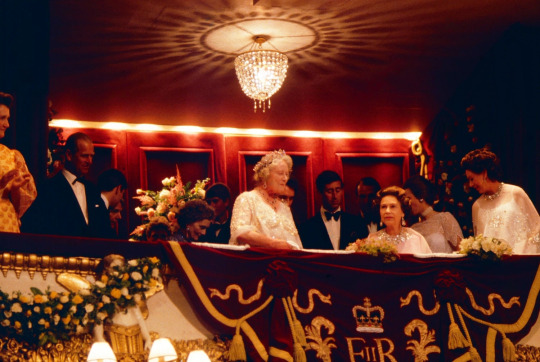
1980
The Queen Mother's 80th birthday celebration at the Royal Opera House, London
#queen elizabeth ii#prince philip#duke of edinburgh#princess anne#princess royal#queen mother#king charles iii#princess margaret#princess alice duchess of gloucester#prince edward earl of wessex#margaret rhodes#prince andrew
39 notes
·
View notes
Note
You are quite literally holding up the djats fans with your amazing work LIKE SO PERFECT EVERYTHING YOU WRITE!!
Thank you so much ❤️❤️❤️
#fanfiction#daisy jones and the six fanfic#daisy jones#daisy jones fanfic#daisy jones & the six#daisy jones and the six#graham dunne x reader#graham dunne x y/n#graham dunne x you#grahamdunne#graham dunne#eddie loving#eddie#eddie roundtree x reader#edward roundtree#eddie roundtree#warrenrojas#warren rhodes x reader#warrenrhodes#warren rojas
18 notes
·
View notes
Text
Support Being The Dark Order
youtube
#amanda huber#negative one#brodie lee jr#evil uno#alex reynolds#john silver#dustin rhodes#danhausen#michael nakazawa#nyla rose#anthony bowens#aubrey edwards#stokely hathaway#willow nightingale#prince nana#jeff jarrett#angelo parker#peter avalon#la faccion ingobernable#brandon cutler#colt cabana#being the dark order#aew#all elite wrestling#aewedit#wrestlingedit#bteedit#Youtube
5 notes
·
View notes
Text


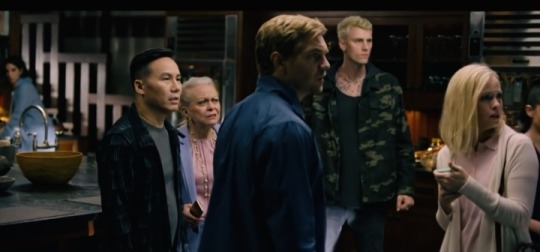
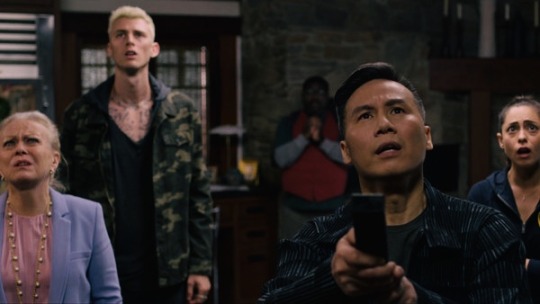






Bird Box
2018
#bird box#horror movies#sandra bullock#sarah paulson#trevante rhodes#jacki weaver#machine gun kelly#rosa salazar#bd wong#julian edwards#vivien lyra blair
6 notes
·
View notes
Text

#marvel#nerd#ucm#mcu#pop#iron man#homem de ferro#tony stark#stark#robert downey jr#anthony edward stark#máquina de combate#james rhodes#don cheadle
23 notes
·
View notes
Text

From the AEW Games 1.0 Special Event
55 notes
·
View notes
Text
Incorrect Quotes#1
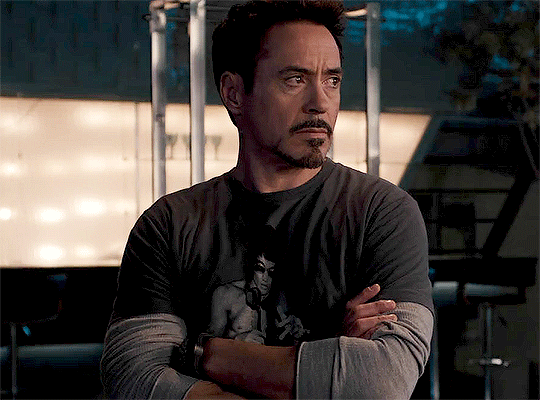
Tony: Do you see me as a father figure, y/n?
Y/n: No. If anything I see you as a bother figure, because you're always bothering.
Pepper: *nods head* Touché
#pepperony#tony stark x reader#incorrect marvel quotes#brooklyn 99#incorrect quotes#marvel#mcu#avengers x reader#avengers x y/n#tony stark x y/n#tony stark x you#anthony edward stark#iron man#tony stark daughter#tony stark fluff#the avengers#morgan stark#james rhodes#tony stank#Tony Stark#tony stark imagine#marvel au#marvel x reader#Tony stark x reader#Anthony Edward Stark#tony stark x femlreader#chaotictasha
157 notes
·
View notes
Text
Y'all: Avengers Halloween
Natasha wouldn't usually dress up for Halloween but Clint dragged her into doing a couples costume. The costume pair was Kim and Ron from Kimpossible.
Steve was blackmailed into being a Teletubby, more specifically Po, by Bucky.
Tony paired up with Rhodey and Bucky and they were The Powerpuff Girls with Tony being Blossom, Rhodey being Bubbles, and Bucky being Buttercup.
Sam was Zazu from The Lion King
Bruce was a dinosaur as per the Hulk's request. He was a Stegosaurus
Thor dressed in drag, which was influenced by Peter and Shuri
Peter, Shuri, Ned, Harley, and MJ were The Croods. Peter was Guy, MJ was Eep, Harley as Grug, Ned as Thunk, and Shuri was Ugga
Pepper agreed to be the grandma
They have a contest and Steve won, mostly because they found out he had never seen Teletubbies. They mark it down on the 'Ways To Torture Steve' list
Tony and Bucky disappeared halfway through the night with an eyeroll from Rhodey, who was the only one that knew they were together after he walked in on them making out in Tony's lab
There were multiple videos taken and posted to the official Avengers social media by the kids
Look, I know it isn't Halloween but this has been in my mind for a really long time and I needed it to leave
#iron man#marvel#mcu#the avengers#tony stark#anthony edward stark#james rhodes#rhodey#winteriron#bucky barnes#james buchanan bucky barnes#james buchanan barnes#steve rogers#captain america#sam wilson#clint barton#hawkeye#clintasha#or not#you pick#peter parker#spiderman#shuri of wakanda#bruce banner#thor odinson#thor wearing drag gives me life idk why#pepper potts#someone plz write or recommend me a fic for this i need to get this out of my system#steve rogers would definitely be a teletubby#change my mind
37 notes
·
View notes
Text
I was randomly reminiscing about using Kandyse McClure as a faceclaim for a character and was like, “I wonder what she’s up to?” and I went to IMDB and ended up down a rabbit hole.
I’ve seen Katee Sackoff’s awesome role in The Mandalorian. I know Michael Trucco is manifesting sexy Ned Flanders in Midnight Mass. What I did not know is that Kandyse McClure and Aaron Douglas have recurring roles in the final season of Motherland: Fort Salem. Grace Park is in a DRAMA and she’s not carrying a gun, it’s called A Million Little Things. James Callis is in what looks to be a campy romp of a show called Blood & Treasure. Edward James Olmos is still (of course) in Mayans M.C. which I haven’t caught up with in a while. I never actually watched Lucifer with Tricia Helfer (and a bunch of other hot humans) so I need to fix that. Mary McDonnell and Michael Trucco are going to be in a show based on and titled “The Fall of the House of Usher” on Netflix next year. Jamie Bamber looks to be doing British things and I don’t have access to them (legally.) Michael Hogan and Tricia Helfer did voices in Mass Effect: Legendary Edition. Tamoh Penikett is in Netflix’s Devil in Ohio (note: I originally wasn’t going to watch it because that title is a Captain Obvious one, but now.) Alessandro Juliani is voice acting and also was in one episode of Devil in Ohio. Nicki Clyne was recently in a micro-budget sci-fi movie called Lunamancer and I just need her to be around more. Rekha Sharma is in the third season of Transplant that came out this year. Leah Cairns was in the Netflix horror series Brand New Cherry Flavor that came out last year. Donnelly Rhodes has sadly passed away but he made a couple appearances in Arrowverse in 2016. And everyone loves Hot Dog, right? Well, unfortunately, Bodie Olmos doesn’t have anything on his IMDB since BSG but there is an unreleased short from 2018 called Dead Drop.
Anyway. That’s my Battlestar Galatica rabbit hole. Would Have kept going but I made myself stop with the cast on the front page of the show’s IMDB.
#battlestar galactica#katee sackoff#michael trucco#kandyse mcclure#aaron douglas#grace park#james callis#edward james olmos#tricia helfer#mary mcdonnell#jamie bamber#michael hogan#tamoh penikett#alessandro juliani#nicki clyne#rekha sharma#leah cairns#donnelly rhodes#bodie olmos#out of oranges
27 notes
·
View notes
